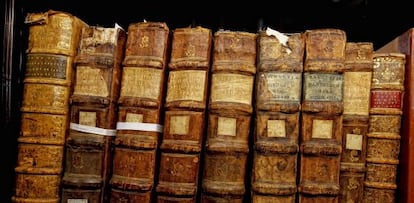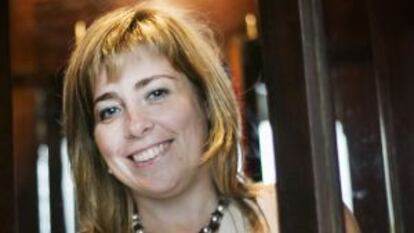Time to count the cost of history
Spain's biographers and researchers meet with obstacles to their work and extremely scant financial reward

Now that so many political memoirs are getting published in Spain (Felipe González, José María Aznar, Rodríguez Zapatero and others come to mind) it would seem that the biographical genre is doing well. But publishers and booksellers know that these days, sales usually represent half or less of any print run. Before this harvest, Aznar (part one), Alfonso Guerra and José Bono sold less than 30,000 copies of each of their books, even though the advances they received meant that three times as many should have been shifted.
But those are casual memoirs, written by neither historians nor biographers. The real historians and professional biographers have a stark future ahead of them, since neither institutions nor publishing houses are willing to pay for the kinds of research projects that they like to embark on. Ian Gibson, one of the great biographers (he is an expert on Federico García Lorca and Luis Buñuel, among others) says that he received an 80,000-euro advance from Aguilar for his work on the Spanish filmmaker, but he spent four years researching and writing the biography.
Paul Preston, another Anglo-Saxon historian, spent years writing The Spanish Holocaust, which verses on the topic of hate during the Spanish Civil War (1936-1939). Like all his other books, he paid for the project out of his own pocket and with modest "publishing advances."
But publishers are not risking any more large advances. Anna Caballé, a biographer and founder of the Biography Studies Unit at Barcelona University, explains that all these circumstances have created "a worrisome abandonment of the biographical genre, without which one cannot explain that the most relevant and influential characters - from Philip II to Franco, Lorca, Dalí, Saint Theresa, Miguel de Unamuno or Antonio Machado - have been left in the hands of international Hispanists."
We lack a political or moral consensus in this country; we trust foreigners"
Asked about the reasons for this national lack of interest in biographies, Caballé replies: "Because the lack of political and moral consensus in our country regarding any aspect of culture makes us trust the objectivity of a foreigner more than our own." The fact is, Caballé adds, that Spain lacks "a biography school capable of addressing the challenges of the genre, which has evolved significantly in just a few years and generated a working method that is solid and efficient."
Britain is more advanced in that respect - and not just in terms of biography writing, but in political memoirs as well. In Spain, these memoirs are little more than ego trips. Preston observes that his country has "a greater tradition of more honest memoirs, perhaps partly because there is also a tradition of fiercer literary criticism. If a memoir falsifies too much, there will be critics to point it out. In Spain that doesn't happen so much." In Britain "there is popular demand for biographies" and publishers either commission them or receive them. "It's a commercial issue," explains Preston.
In Spain, biographies and memoirs "bring in some business in a few cases, and in others not..." says Miguel Aguilar, director of publishing house Debate. "The Steve Jobs biography was a success with over 150,000 copies sold, and so was, on a different scale, that of Queen Isabel II by Burdiel... As for commissioned biographies, Taurus has released a very interesting collection, but there is no doubt that [Spanish] universities and publishers have fewer resources than our British or American colleagues when it comes to financing long research projects. Gerald Martin, for instance, spent 17 years investigating the life of Gabriel García Márquez."
Gonzalo Pontón was one of the pioneers of history book publishing (including the Azaña diaries, 35 years ago). Now the head of the Pasado y Presente label, he has clear ideas about the repercussion of history on the publishing industry.
If a British memoir falsifies too much, there will be critics to point it out"
"Of all the social sciences, history is the most attractive to the wider public, although sometimes it can start with the kind of mistake that Pierre Vilar, the noted French Hispanist, pointed out ('I like battles' or 'I want to know the history of my country'). No matter: exploring history books arouses one's interest in the economy, politics and social alliances and confrontations."
While some voices ask for institutional support for history books and biographical literature, others reject the notion outright. "There is no way," says Pontón. "History in the hands of governments becomes a tool for domination and control. The worst nightmares created by nationalisms have always begun with a revision of history, in other words, the construction of false identities based on myths, and the identification and denunciation of the enemies of the homeland."
Ramón Perelló, who is the director of Península, part of Grupo Planeta, talks about the editing work that goes into memoirs, which are often accused of not being written by the person whose name appears under the title.
"Just like any book containing facts, dates and names, they entail a very intense and rigorous job of editing, because personal memories tend to be very treacherous. But there is no good basis for that general accusation that all politicians use ghost writers for their memoirs. What's more, I don't know of anyone who, with or without help from fact-checkers, did not review every part of their book down to the last comma before going to press."
It is ruinous. The publisher makes a little, and the author practically nothing"
So are political memoirs good business? "They are a service that a publishing group wishing to comply with the majority demand must address," says Perelló. He does not support the idea of subsidies, either, except in cases of mutual interest: he notes that his own publishing group was already releasing this sort of memoir during Spain's transitional period, "and afterwards we have continued to do so every time we felt that the proposal was solid and interesting."
Ángel Viñas, a historian whose specialty is the Spanish Civil War, did not have much trouble conducting his research "because I have worked at open archives." The few times when he had to ask for permits, he found hurdles at the Defense Ministry, "which has slowly been liberalizing. But the current minister has abruptly ended this trend. I suppose he must fear that there are a lot of skeletons in the closet. And there certainly are. Spain, which once led the rest of Europe in the release of certain files, now has the doubtful honor of having dropped to the back of the pack."
Matilde Eiroa, a historian who deals with similar subject matter as Viñas, explains: "The Defense Ministry archives have progressed and improved significantly, especially since the times of
Carme Chacón and her support for the Historical Memory project. There is a conflict because during Chacón's last period in office it was said that around 10,000 documents would be released, but with the victory of the Popular Party [in 2011], this liberalization has been put on hold."
Authors are forced to buy a number of their own books at bookstore prices
Research is expensive. Would grants be convenient? Viñas replies that when grants have been announced, the paperwork was so impenetrable that it was not even worth trying.
Is it a profitable endeavor, then? "It is quite ruinous. The publisher makes just a little, and the author practically nothing. Writing a book based on archive material can never make for a bestseller. The revenues do not make up for the research expenses." Eiroa expands on this point: "The money handed out is scant and does not allow historians, especially those who live in places with no state archives, to spend a lot of time consulting their files, because the money allotted to living expenses is very limited." This explains why a lot of local and territorial history gets done.
So what should the publishers do? "We know they are there to make money, but their efforts to invest in history are pretty reduced," she says. "There are publishers who don't even reply when they get a manuscript. These days, most publishers are asking historians for money to publish [...]; sometimes they ask them for part of the publishing costs, and sometimes for the whole thing. In some cases the author is forced to buy a certain amount of his or her own books at bookstore prices."
There are many factors that hinder historical and biographical research. The historian Mercedes Cabrera enumerates a few: "A public policy on archives that is either absent or very deficient, not at all transparent, arbitrary or indecisive, at least until recently. I think in part it is because of our past and all the taboos, prohibitions and political battles involving our past. But it is also partly because of unpremeditated reasons involving lack of oversight of the archive custodians. This has been improving in recent times, but there is still a long way to go. There is also a lack of personal archives, and a resistance, if not downright refusal or at least reticence, on the part of families and heirs to letting researchers access existing archives."
To all these factors she adds "a timid, non-existent publishing policy that is the result of a reduced readership."
The publishers, adds Cabrera, "have played it safe and run very few risks, and when they have provided early funding it favored well-established writers or well-known characters. The search for a bestseller has been more important than the quality of the biography, to put it bluntly. Although there are a few very salient exceptions."
They are not profitable, yet they are being written. Is there any particular reason why? "We should distinguish between the genres," says José María Pozuelo Yvancos, a literature professor and critic. "The memoirs of a politician, which nearly always ride on the back of commercial opportunity, cannot have the same quality as an autobiography written by creators, poets or novelists. They have often been lumped together, but they don't have much in common."
This scholar cites the work of people like Carlos Barral, Jaime Gil de Biedma, Caballero Bonald or Castilla del Pino as examples of quality work compared with the books now hogging headlines in print, radio and television. He sees three reasons for the proliferation of memoirs: the first-person account is no longer seen as a taboo; women have started to explore the genre; and it has built "a room of its own, to use a title by Virginia Woolf." Regarding the fact that the families of individuals who deserve biographies sometimes make life difficult for researchers, this expert notes that this is exactly what happened with the turn-of-the-century playwright and novelist Valle Inclán. "Fortunately, now there is a consensus on the need to open up personal archives."
"Publishers have no time for new writers"

When the friends of Sandra Bruna ask her to recommend a book, she says that she only reads manuscripts.
This blue-eyed, smiling, personable Catalan has spent more than 20 years as an intermediary between writers hungry for success and a publishing world avid to find the new writer of the moment. She tells writers what sort of themes have been working well lately - "the most important thing in a literary agent is honesty" - and helps them to polish up the novel, choose a title, or even use a pseudonym.
"Sometimes I mother them a bit," she admits, in reference to the moral support a writer may need when things are not going his or her way.
Part of Bruna's success stems from her discovery of Ildefonso Falcones, a lawyer who for four years spent some time every morning and evening writing a historical novel. Only nine months after its eventual publication in 2006, El cathedral del mar (or, Cathedral of the sea) had sold over a million copies, and is now published in 40 countries with massive sales worldwide.
It was the first big success as an agent for Sandra Bruna, who in 2001, when she was only 28 and had worked for a decade with the big agency Mercedes Casanovas, set up her own business.
The success of El catedral del mar flooded her office with manuscripts.
"Everyone wanted a piece of us," she remembers between sips of coffee in the Barcelona bar where she breakfasts every morning. "People thought we would practically write the book for them," she laughs.
Turning to the state of the industry at the current moment, Sandra Bruna drops the cheerful tone. "Today the publishing houses don't seem to have the time of day for new writers. They send back lots of texts, saying they're perfect but nobody knows the author."
Bad news for her agency, whose stock in trade is precisely unknown writers: of the 95 writers she now represents, about half have published their first novel thanks to her company's efforts. "And most of them have later published their second or third."
No one is infallible, however. Bruna regrets the fact that her agency has lately allowed some writers "of great potential" to slip by, because they were unknown names. So she is trying a new solution: "We have shifted from being literary agents, to digital publishers." When they like an author, they publish their book in electronic format. If this works well, then the publishing houses agree to the quantum leap to paper.
This use of the e--book underlines the fact that unlike many in her field, Bruna does not believe that the digital book, which facilitates self-publishing, is going to put her out of business. "You can't take fright at a new sales channel; you just have to know how to cultivate it, so as to have influence on that scene too."
This expert in making writers' dreams come true considers that, yes, you can teach people to write, but this doesn't make a writer out of just anyone.
"Knowing how to play the guitar doesn't make you a guitarist."
Tu suscripción se está usando en otro dispositivo
¿Quieres añadir otro usuario a tu suscripción?
Si continúas leyendo en este dispositivo, no se podrá leer en el otro.
FlechaTu suscripción se está usando en otro dispositivo y solo puedes acceder a EL PAÍS desde un dispositivo a la vez.
Si quieres compartir tu cuenta, cambia tu suscripción a la modalidad Premium, así podrás añadir otro usuario. Cada uno accederá con su propia cuenta de email, lo que os permitirá personalizar vuestra experiencia en EL PAÍS.
¿Tienes una suscripción de empresa? Accede aquí para contratar más cuentas.
En el caso de no saber quién está usando tu cuenta, te recomendamos cambiar tu contraseña aquí.
Si decides continuar compartiendo tu cuenta, este mensaje se mostrará en tu dispositivo y en el de la otra persona que está usando tu cuenta de forma indefinida, afectando a tu experiencia de lectura. Puedes consultar aquí los términos y condiciones de la suscripción digital.









































